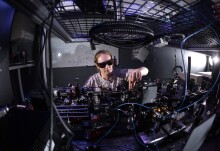

Scientists and musicians discuss the science behind improvisation - <em>News</em>
See also:
Related news stories:
By Lucy Goodchild
Wednesday 26 May 2010
The way a person’s brain responds when they are listening to a musician improvising was one of the topics discussed at an Imperial conference this month.
At the "Complexity and Networks – Neuroscience” conference, internationally renowned concert pianist Dr David Dolan performed some improvised music with the classical music group Trio Anima, to illustrate how a musician’s creativity can affect a listener’s response to music.
Professor Henrik Jensen (Mathematics), who organised the conference, introduced a variety of speakers, who covered topics including the psychology of emotional moments in music, how to analyse musical creativity and perceptions of beauty.
In the first talk of the day, Dr Dolan discussed improvisation, the risk musicians take when they stray from the written score, and the effect this has on the audience’s reaction. He demonstrated this by performing several group improvisations with Trio Anima, then asking the audience for their feedback.
The conference, held on Wednesday 19 May, attracted mathematicians, physicists, neuroscientists and musicians.

In this video, Professor Henrik Jensen from Imperial and Professor John Sloboda from the Guildhall School of Music & Drama talk about why music and maths fit together and how they plan to study neurological responses to improvisation, and Dr David Dolan performs with Matthew Featherstone on flute, Andrew Balch on viola and Anneke Hodnett on harp.
-Ends-
Article text (excluding photos or graphics) available under an Attribution-NonCommercial-ShareAlike Creative Commons license.
Photos and graphics subject to third party copyright used with permission or © Imperial College London.





